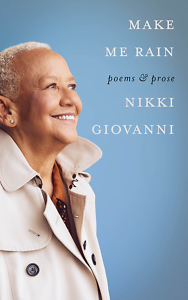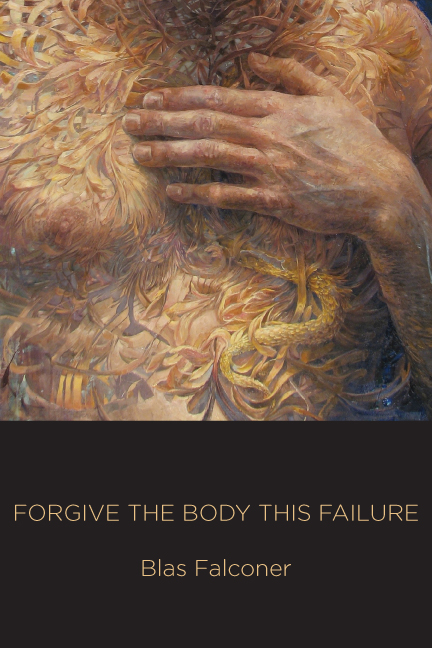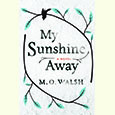A Bold, Tender Voice
Make Me Rain delivers quintessential Nikki Giovanni
In this tumultuous time, it can be comforting to remember that others have gone before us and are still here to guide and nourish us with their words. One such guide is beloved poet and literary giant Nikki Giovanni. For more than five decades, Giovanni has written about what it means to be a Black woman in America, calling attention to the injustices suffered by her community but also to its joys and triumphs. In her new collection of poetry and prose, Make Me Rain, her unique voice, bold yet tender, is on display again with a new relevance.
 Over her acclaimed career, Giovanni — a Knoxville native and Fisk University graduate — has written more than 30 books for adults and children. The writing in Make Me Rain is quintessential Giovanni, with the mixture of pride and brashness, honesty and playfulness that is her trademark. The title seems to portend a more contemplative understanding of the world, one that is intensely personal. But the work within this slim volume also packs a punch, offering us a potent message of hope and resilience just when we need it most. “Let me be the cloud / that embraces you / or the quilt / that gets you dry,” she writes in the title poem.
Over her acclaimed career, Giovanni — a Knoxville native and Fisk University graduate — has written more than 30 books for adults and children. The writing in Make Me Rain is quintessential Giovanni, with the mixture of pride and brashness, honesty and playfulness that is her trademark. The title seems to portend a more contemplative understanding of the world, one that is intensely personal. But the work within this slim volume also packs a punch, offering us a potent message of hope and resilience just when we need it most. “Let me be the cloud / that embraces you / or the quilt / that gets you dry,” she writes in the title poem.
By contrast, her righteous anger is palpable in “You Talk About Rape (for donald trump)”: “Ever since the Europeans / joined the African/ Slave Trade / I’ve been Raped.” She will not be daunted and neither should we: “My hopes will live / despite trumpeting / sounds of white / supremacy.”
The poems and occasional short prose pieces interspersed throughout the book alternate seamlessly between the personal and the political. In the timely poem “Vote,” Giovanni reminds us why it is important not to be silenced:
Folks were lynched
Folks were shot
Folks’ communities were gerrymandered
Folks who believed
In the Constitution were lied to
Burned out
Bought and sold
Because they agreed
All Men Were Created Equal
Folks vote to make us free
 One of the most remarkable qualities of Giovanni’s poetry is that it can be direct and uncompromising while also being deeply honest and utterly human. The raw tenderness of poems like “Big Sisters,” “I Am Your Sweatshirt,” and “Some Call It Love” — poems about being liked for who you are and the quiet enjoyment of life’s simple pleasures — give way to the more outspoken tone and fierce pride of “The Blues” and “I Come from Athletes.” Lines like “We stirred the blues / In our stews / To give us the strength to go on” carry the weight of many generations in their vibrant economy.
One of the most remarkable qualities of Giovanni’s poetry is that it can be direct and uncompromising while also being deeply honest and utterly human. The raw tenderness of poems like “Big Sisters,” “I Am Your Sweatshirt,” and “Some Call It Love” — poems about being liked for who you are and the quiet enjoyment of life’s simple pleasures — give way to the more outspoken tone and fierce pride of “The Blues” and “I Come from Athletes.” Lines like “We stirred the blues / In our stews / To give us the strength to go on” carry the weight of many generations in their vibrant economy.
In one of her best-known poems, “Nikki-Rosa,” written in 1968, Giovanni writes “Childhood remembrances are always a drag if you’re Black.” The poem, often taught in high school English classes, examines the ways in which white society tends to misrepresent Black Americans’ experiences, focusing only on stereotypical narratives of hardship and poverty. But for Giovanni, then as now, her focus is on the enduring sense of community and love, of holidays spent together with family, of meals shared and songs sung, offered as antidote to reductive notions of what it means to be Black.
Indeed, the images repeated most often in this work, such as quilting and cooking, evoke the warm familiarity of home and family but call forth Giovanni’s cultural heritage, too. Cozy, domestic imagery can seem overly sentimental and hollow, but Giovanni uses it in surprising ways to express something more complex and expansive: “Soup is a quilt / wonderful vegetables / bones from a ham / other pieces added / to fresh water / garlic / and lots of love.”
In an essay called “We Write,” a meditation on the importance of storytelling and honoring the past, Giovanni celebrates her own vocation: “Black ink should be a soup or a drink or something we can embrace with pride. Black Lives Matter. Black Ink reminds us of why.” She didn’t learn to quilt, she says, but she did learn to cook and to listen to her ancestors, and most importantly, to write.
[Nikki Giovanni’s 2016 tribute to Alex Haley, part of Chapter 16’s celebration of Pulitzer Prize-winning Tennessee writers, can be read here.]

Joy Ramirez holds a Ph.D. in comparative literature. She taught Italian at Vanderbilt University and the Colorado College. She now writes and lives in East Nashville.


